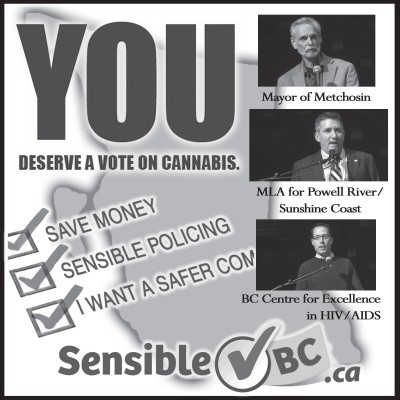At the end of Sept. the Union of B.C. Municipalities voted on a resolution lobbying Ottawa to decriminalize marijuana and study the benefits of taxing and regulating cannabis in Canada. While this affects no real change in the laws, it is a small step that signifies that public leadership in British Columbia has reached a tipping point when it comes to the prohibition of marijuana. The motion, put forward by Metchosin Mayor John Ranns reflects the growing frustration municipal politicians are facing with the increasing financial and social costs of this ideological war on a plant.
On Mon. Sept. 24, there was an informed debate held for all the UBCMers in Victoria to attend. The panelists supporting the motion—all from Stop The Violence BC—included Dr. Evan Wood, BC Centre for Excellence in HIV/AIDS; Geoff Plant, Former Attorney General; and Constable David Bratzer, Law Enforcement Against Prohibition. On the other side endorsing the merits of prohibition was Dr. Darryl Plecas, University of Fraser Valley; Dave Williams, Drug Enforcement Branch, RCMP “E” Division; and Com. Pat Slack, Snohomosh County Drug Task Force, Washington State.
The following Wed. it was time for those at the UBCM to debate and vote on the motion. “For too long our communities have borne the brunt of the harmful consequences of cannabis prohibition, from increased gang violence on our streets to enormous costs of enforcing a thoroughly discredited policy,” Mayor Ranns offered. Councillor Moralea Milne of Metchosen, and author of the motion, reminded delegates that former attorney General Geoff Plant termed cannabis prohibition “a disastrous and expensive failure of public policy.” She said more than 500,000 B.C. residents have smoked marijuana, but she doesn’t support its use. “Personally, I’d rather have a martini, and I’m allowed to because we changed that very wrong prohibition stance that we had,” Milne said.
Okanagan-Similkameen area director Tom Siddon, a former federal cabinet minister, said his local police reject decriminalization. “I think we’ve been frying too many brains,” Siddon said. “It’s going to aggravate the temptation of young people to move from marijuana, which may well be more harmless than a few bottles of beer, to being hooked on heroin, cocaine and the chemical designer drugs.”
Prince George city councillor Brian Skakun drew laughter with his comment: “I tried it when I was younger, I turned out OK.” Turning serious, he said the costs extend to police and courts weighed down with marijuana cases rather than “real criminals.”
Abbotsford councillor Henry Braun agreed with Siddon. “We produce about 1.5 million pounds of marijuana in British Columbia,” Braun said. “We consume about 185,000 pounds, so the vast majority of marijuana is being exported to the U.S. and other places.”
Port Moody councillor Bob Elliott spoke of how his “quaint, safe city” has seen three gang-related murders in the past six months. He was completely supportive of decriminalization and pleaded with his fellow delegates to support the motion as well.
Coquitlam councillor Terry O’Neill called decriminalization “the worst of all worlds,” protecting people from simple possession charges while leaving large-scale growing and sales in the hands of criminals.
Nelson councillor Robin Cherbo said sparing youth from prosecution is worth it, and even outright legalization won’t stop the criminal trade as long as cannabis remains illegal in the U.S.
Cariboo Regional District director Joan Sorley reminded delegates that grow-ops are destructive to communities and dangerous to police and fire departments. “They’re huge operations,” Sorley said. “If we decriminalize it, we take away the tool that the RCMP has to try and shut them down and help keep our neighbourhood safe.”
The vote, done by a show of hands counted three quarters of the delegates supporting the motion, news received with cheers and clapping from those in attendance at the convention.
Langley Township Councillor Steve Ferguson was surprised and disappointed that delegates passed the motion. He and Al Siebring, a councillor from North Cowichan, challenged the method of voting, but were overruled. “I was surprised at the level of misunderstanding. The gangs aren’t going to go away. In fact, they could go into greater production to supply the U.S. market, and we won’t be reducing police numbers in our communities.” He later told the Langley Times.
This a debate that is going to continue to be ongoing through the media, which in the last week has exploded with articles and letters about this issue thanks in part to this resolution passing but, also because of the Sensible BC Referendum campaign also had its kick-off event in Victoria the Monday before the vote.
Despite the oppression we are facing with our federal government, I can only look at these latest events as more proof that we are reaching the masses with the facts that need to be known. A reason to celebrate, to be sure, but not a time where we can afford to rest on our laurels. There is a certain momentum that has been gained, and we can do our part to keep this momentum going.
It is especially important that we sharpen our pencils, and endorse what the UBCM resolution is calling for through letters to the editor of your local papers, or other online mediums. If you’re more of talker, then contact your local council and mayor, and share with them your appreciation and/or disappointment with how they voted on this resolution. Don’t be afraid to take the time to educate your local politicians who are more likely to be devoted to the wants and needs of the people in their communities, than those in federal, or provincial positions.
Change will not be brought about by a politician with a conscience, though it has certainly helped that we have had some conscientious politicians on our side. Real change to these failed policies will only come if we, the people, make it politically uncomfortable for our politicians to do anything but agree with what the evidence supports.




